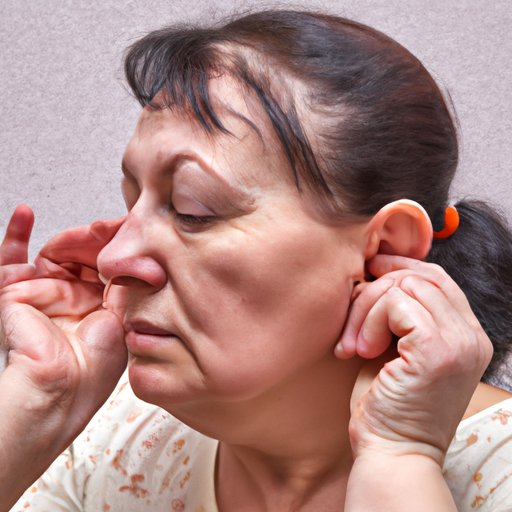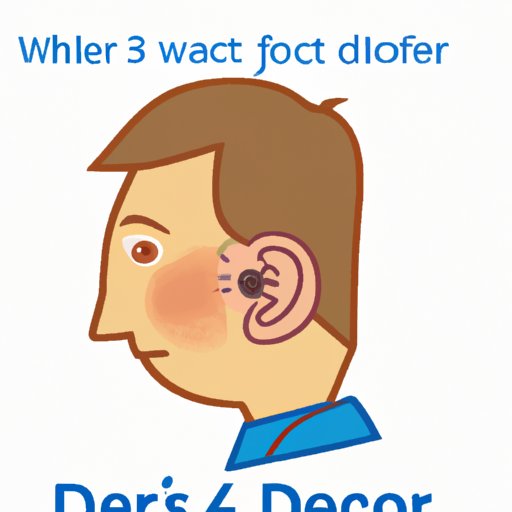
I. Introduction
If you have ever experienced an ear infection, you know how painful and unbearable it can be. An ear infection is a common condition that affects people of all ages but is most common in children. It occurs when bacteria or viruses infect the middle ear, leading to inflammation and fluid buildup. This article aims to explore natural and medical remedies that can help you get rid of an ear infection and prevent it from reoccurring.
II. Natural Remedies for Treating Ear Infection
Natural remedies have been used for centuries to treat various health conditions, including ear infections. Here are some natural remedies for treating ear infections:
A. Garlic oil
Garlic oil is a popular natural remedy for ear infections due to its antibacterial and anti-inflammatory properties. To use garlic oil, warm it up slightly and use a dropper to put a few drops in the infected ear. Leave it for a few minutes and then tilt your head to drain the oil out. Repeat this process twice a day until the infection clears up.
B. Warm Compress
Applying a warm compress to the affected area can help relieve pain and reduce inflammation. You can use a warm cloth or a heating pad. Place the compress on the affected ear for 15-20 minutes several times a day until the infection goes away.
C. Tea Tree Oil
Tea tree oil has antiseptic and anti-inflammatory properties that can help relieve ear infections. You can add a few drops of tea tree oil to olive oil or coconut oil and use a dropper to put a few drops in the infected ear. Leave it for a few minutes and then tilt your head to drain the oil out. Repeat this process twice a day until the infection clears up.
D. Other Options
Other natural remedies that can help treat ear infections include apple cider vinegar, onion juice, and breast milk. However, it’s essential to consult a doctor before using any natural remedy, especially for children.
III. Medical Treatments for Ear Infection
If the infection is severe, your doctor may recommend medical treatments to help clear up the infection. Here are some medical treatments for ear infections:
A. Antibiotics
If the infection is caused by bacteria, your doctor may prescribe antibiotics to help clear up the infection. It’s important to take the full course of antibiotics prescribed, even if you feel better after a few days.
B. Eardrops
Eardrops can be used to treat ear infections caused by bacteria or fungi. Eardrops containing antibiotics or antifungal medication can help clear up the infection and reduce inflammation.
C. Other Medical Treatments
In severe cases, your doctor may recommend other medical treatments, such as surgery or a myringotomy, to help drain the fluid and relieve pressure on the ear.
IV. Lifestyle Changes to Prevent Ear Infection
Prevention is key when it comes to ear infections. Here are some lifestyle changes you can make to prevent ear infections:
A. Keeping the Ear Dry
Make sure to dry your ears thoroughly after swimming or taking a shower. You can use a towel or a blow dryer on a low heat setting.
B. Not Inserting Foreign Objects or Cotton Swabs into the Ear
Avoid inserting foreign objects or cotton swabs into your ear, as they can irritate the ear canal and increase the risk of infection.
C. Avoiding Smoking
Smoking can irritate the ear canal and increase the risk of infection. If you’re a smoker, try to quit or reduce your smoking.
D. Other Lifestyle Changes
Other lifestyle changes that can help prevent ear infections include eating a healthy diet, getting enough sleep, and managing stress.
V. Home Remedies for Relieving Ear Pain
Ear pain can be an intolerable symptom of an ear infection. Here are some home remedies that can help relieve ear pain:
A. Applying Cold Compress
Applying a cold compress to the affected area can help relieve pain and reduce inflammation. Wrap a few ice cubes in a towel and apply it to the affected ear for 15-20 minutes several times a day.
B. Using Pain Relief Medication
You can use over-the-counter pain relief medication, such as ibuprofen or acetaminophen, to relieve ear pain. Always consult your doctor before taking any medication, especially for children.
C. Other Home Remedies
Other home remedies that can help relieve ear pain include putting a few drops of warm olive oil or hydrogen peroxide into the ear, chewing gum to help relieve pressure on the ear, and using a humidifier to help keep the air moist.
VI. Importance of Hygiene in Preventing Ear Infection
Good hygiene habits can help prevent ear infections. Here are some hygiene habits you should adopt:
A. Washing Hands Regularly
Wash your hands regularly with soap and water, especially before eating or touching your face. This can help prevent the spread of bacteria and viruses that can cause ear infections.
B. Keeping Ears Clean
Regularly clean your ears with a soft, damp cloth to remove excess earwax and dirt. Avoid using cotton swabs, as they can push the earwax deeper into the ear canal.
C. Other Hygiene Habits
Other hygiene habits that can help prevent ear infections include wearing earplugs in noisy environments, avoiding close contact with people who have a cold or flu, and keeping your immune system strong by eating a healthy diet and getting regular exercise.

VII. When to See a Doctor for Ear Infection
While most ear infections clear up on their own or with natural remedies, some may require medical attention. Here are some signs that indicate the need for medical attention:
A. Symptoms that indicate the need for Medical Attention
Fever, severe pain, dizziness, hearing loss, and discharge from the ear are all signs that you need to see a doctor for an ear infection.
B. When to see a Doctor for Ear Infections
If you or your child have symptoms of an ear infection that last longer than a few days, are severe, or are accompanied by other symptoms, such as fever, it’s important to see a doctor.
VIII. Conclusion
Ear infections are a common but painful condition that can be treated with natural and medical remedies. Prevention is key when it comes to ear infections, and making simple lifestyle changes can go a long way in preventing them from occurring. If you do develop an ear infection, it’s important to seek medical attention if the symptoms are severe or prolonged.




